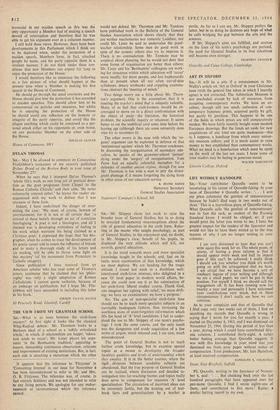THE VIEW FROM MY GRAMMAR SCHOOL
SLR,--What is at issue between the sixth-form masters? At first sight it looks like the classical Whig-Radical debate: Mr. Thornton looks to a Burkean ideal of a school as a 'subtly articulated whole,' in which, if relationships are happy, 'educa- tion tends to occur'; Mr. Lister places his argu- ment 'in the Benthamite tradition,' appealing to reason, demanding continuous observation, criticism and improvement of existing institutions. But, in fact, each side is attacking a stereotype which the other
It appears that the reference to 'Fitzjones' in 'Consuming Interest' in our issue for November 6 has been misunderstood to refer to Mr. and Mrs. 0. B. Fitzjones. The reference was, of course, in fact entirely fictitious and was not intended to refer to any living person. We apologise for any embar- rassment or inconvenience which this reference caused. would not defend. Mr. Thornton and Mr. Tomkins have published work in the Bulletin of the General Studies Association which shows clearly that they are neither reactionaries nor romantic Luddites; nor could Mr. Lister be said to undervalue the pupil- teacher relationship. Some men do good work in spite of the system; others also try to improve it. There is no contradiction. Mr. Tomkins may be sceptical about planning, but he would not deny that some forms of organisation are better than others; Mr. Lister and his 'Benthamite' colleagues are work- ing for structures within which education will 'occur' more readily, for more people, and less haphazardly than at present when all too often out-of-date syllabuses, dreary textbooks and crippling examina- tions obstruct the 'meeting of minds.'
Two things worry me a little about Mr. Thorn- ton's argument. One is the assumption that it is meeting the teacher's mind that is uniquely valuable. Many of us feel that sixth-formers should be en- couraged to move on to a direct confrontation with the object of study—the literature, the historical problem, the scientific inquiry or whatever. It seems better to cut the umbilical cord some time before the leaving age (although there are some university dons who try to reconnect it).
The other worry is the case with which the 'or- ganic' argument can be exploited in defence of that 'institutional egoism' which Mr. Thornton condemns. In discussing the reorganisation of secondary edu- cation, he speaks of the grammar-school 'patient' dying under the 'surgery' of reorganisation. Tom Paine had an equally colourful metaphor for a defender of another ancien regime. though I'm sure Mr. Thornton is too wise a man to pity the direct- grant plumage if it means forgetting the dying birds in other dreas of our education service.
R. IRVINE SMITH
Honorary Secretary General Studies Association Stationers* Company's School, N8




























 Previous page
Previous page